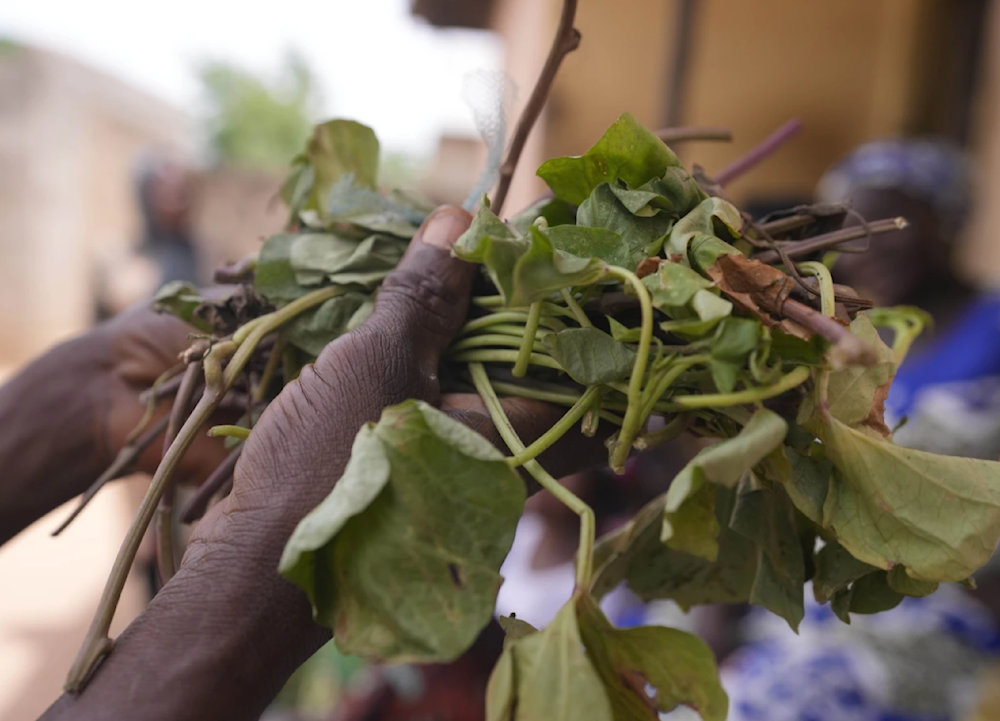Funding cuts drying up aid for malnourished children, UN says
Humanitarian organizations from across the world have been reeling since Donald Trump returned as president in January and immediately halted most US foreign aid money.
-

Hauwa Bwami, a 50-year-old widow and mother of 5, shows orange-fleshed sweet potato leaves in Kaltungo Poshereng, Nigeria, on June 2, 2024 (AP)
Global aid cuts are causing a "child survival crisis," according to the UN, which warned that medication for over a million chronically malnourished children in Nigeria and Ethiopia could soon run out.
The United Nations children's agency lamented the catastrophic effects for children worldwide of the recent abrupt cuts to aid by the United States, the world's top contributor, and other countries.
"Even a brief halt in UNICEF's critical life-saving activities risks the lives of millions of children at a time when needs are already acute," UNICEF deputy head Kitty van der Heijden told reporters in Geneva from Nigeria.
Humanitarian organizations from across the world have been reeling since Donald Trump returned as president in January and immediately halted most US foreign aid money.
Van van Heijden said she witnessed the effects of the "sharp decline in funding support for our lifesaving work" this week during travels to Ethiopia's northern Afar region and northeastern Nigeria's Maiduguri district.
The official warned that funding gaps meant "nearly 1.3 million children under five suffering from severe acute malnutrition could lose access to treatment over the course of the year, leaving them at heightened risk of death."
Without these essential interventions, children's lives are in jeopardy, she added, noting that just seven of the 30 mobile health and nutrition units that UNICEF supports in Afar are presently operating.
"This is a direct result of the global funding crisis," she emphasized.
Without new funding, van der Heijden warned that UNICEF will soon run out of so-called Ready-to-Use Therapeutic Food (RUTF) to treat severely malnourished children.
She stated that the inventories in Ethiopia, where an estimated 74,500 children need treatment each month, will run out in May.
In Nigeria, where 80,000 children require similar therapy each month, the agency's stocks might run out "sometime between this month and the end of May," she warned.
Van van Heijden emphasized the "significant progress" achieved in addressing the worldwide childhood malnutrition epidemic over the last quarter century.
"Since 2000, the number of stunted children has decreased by 55 million, or one-third," she added, noting that UNICEF and its partners provided malnutrition prevention support to 441 million children under the age of five throughout the world last year.
According to the organization, a total of 9.3 million people got treatment for severe wasting and other types of severe acute malnutrition.
Those hard-earned gains are being reversed, van der Heijden explained, detailing how the issue was not only the number of reductions but also "how they were made, in some cases, suddenly and without warning, leaving us with no time to mitigate their impact on our children's programmes."
"The funding crisis goes far beyond Ethiopia and Nigeria," she divulged, emphasizing that this was a global problem leaving the "most vulnerable children" to bear the brunt.
UNICEF predicts that more than 213 million children from 146 countries will require humanitarian assistance by 2025.
Van der Heijden called it a "child survival crisis" completely preventable, urging the international community not to fail children this way.

 3 Min Read
3 Min Read








